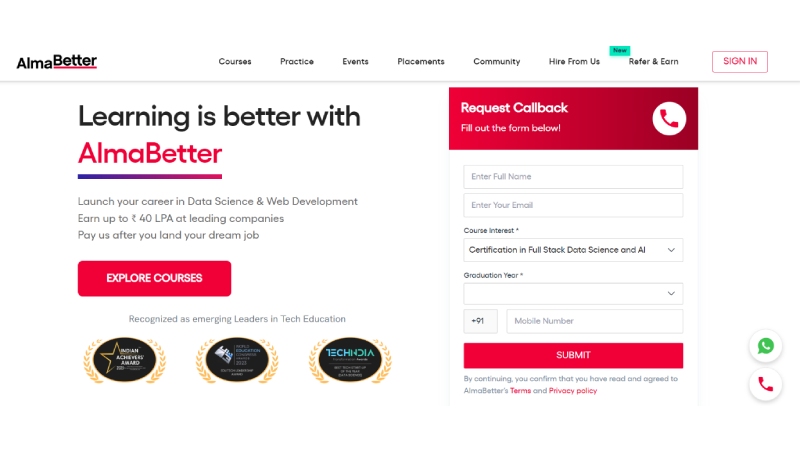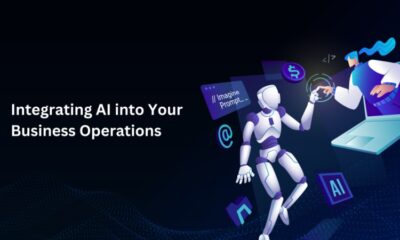News
Revolutionising Education: How E-Learning is Growing in India

In recent years, India has witnessed a remarkable transformation in its educational landscape, with the advent of e-learning playing a pivotal role in this evolution. E-learning, also known as online learning, refers to the use of electronic technologies to deliver educational content and facilitate interaction between students and instructors remotely. This learning mode has gained significant traction across various segments of the population, from school students to working professionals seeking to upskill or pursue advanced degrees. Amidst this educational revolution and the integration of technology are reshaping traditional learning paradigms and expanding access to quality education like never before.
The Rise of E-Learning in India:
India’s education system has long been characterized by challenges such as limited access to quality education, inadequate infrastructure, and geographical disparities. E-learning, including web dev, cyber security, digital marketing, and data science courses in Bangalore, as well as other regions in India, has emerged as a viable solution to address these challenges by leveraging digital platforms to deliver educational content to learners across the country. With the widespread availability of smartphones and affordable internet connectivity, e-learning has become accessible to a vast segment of the population, including those in remote rural areas.
The COVID-19 pandemic further accelerated the adoption of e-learning in India as schools and educational institutions were forced to shift to online modes of instruction to ensure continuity of learning amidst lockdowns and social distancing measures. This unprecedented shift highlighted the resilience and adaptability of e-learning platforms, which quickly pivoted to meet the evolving needs of students and educators. From live virtual classrooms to pre-recorded lectures and interactive multimedia content, e-learning platforms offer a diverse array of learning experiences tailored to individual preferences and learning styles.
Breaking Barriers to Education:
E-learning is breaking down traditional barriers to education by democratizing access to quality learning resources irrespective of geographical location or socioeconomic background. In a vast and diverse country like India, where millions of students lack access to quality educational institutions, e-learning platforms such as AlmaBetter, Skillshare, edX, Udacity, etc serve as a bridge to academic opportunities previously beyond reach. Students can enroll in online courses offered by prestigious universities and institutions from the comfort of their homes, eliminating the need to relocate or incur exorbitant expenses associated with traditional education.
Furthermore, e-learning platforms offer flexible learning schedules, allowing students to balance their studies with work or other commitments. Working professionals, in particular, are increasingly turning to e-learning to acquire new skills and advance their careers without interrupting their professional responsibilities. Whether pursuing a masters in data science or honing specialized skills in fields like artificial intelligence, digital marketing, or cybersecurity, e-learning provides a convenient and accessible pathway to professional development.
Empowering Learners Through Technology:
E-learning platforms are revolutionizing education by harnessing the power of technology to personalize learning experiences and cater to diverse educational needs. With the guidance of top instructors, students have access to a wealth of resources, including video lectures, interactive quizzes, simulations, and virtual laboratories. These resources not only enhance understanding and retention of concepts but also foster critical thinking, problem-solving skills, and digital literacy among learners.
Moreover, e-learning platforms leverage data analytics and insights derived from user interactions to optimize course content and delivery methods continually. By analyzing learner behavior, preferences, and performance metrics, educators can tailor instructional strategies to meet individual learning needs effectively. This data-driven approach not only enhances the effectiveness of teaching and learning but also enables educators to identify areas for improvement and refine course offerings in real-time.
Challenges and Opportunities:
While e-learning holds immense potential to revolutionize education in India, several challenges persist, including the digital divide, quality assurance, and ensuring equitable access to educational resources. Addressing these challenges requires concerted efforts from policymakers, educators, technology providers, and other stakeholders to bridge the gap and create an inclusive learning ecosystem that caters to the diverse needs of learners across the country.
Despite these challenges, e-learning presents unprecedented opportunities to transform education and empower learners with the knowledge and skills needed to thrive in the digital age. As technology continues to evolve, e-learning platforms will play an increasingly integral role in shaping the future of education in India, driving innovation, fostering lifelong learning, and unlocking new avenues for personal and professional growth.
Conclusion:
E-learning is redefining the landscape of education in India, offering a flexible, accessible, and personalized learning experience to learners of all ages and backgrounds. With the convergence of technology and education, facilitated by the expertise of masters in data science, e-learning platforms are poised to drive educational innovation, expand access to quality learning resources, and empower millions of learners across the country. As India continues its journey towards digital transformation, e-learning will remain at the forefront, revolutionizing education and shaping the future of learning in the 21st century.
-

 Business4 weeks ago
Business4 weeks agoSignificance of Small Business Saturday, an Annual Shopping Holiday
-

 Education3 weeks ago
Education3 weeks agoSwiss International University Acquires Four Prestigious Academies in Switzerland, Dubai, and Kyrgyzstan for $21.7 Million
-

 Startup3 weeks ago
Startup3 weeks agoAdam Strobel: Navigating the Shift from Tech Start-Up to Industry Leader
-

 Business4 weeks ago
Business4 weeks agoHow Efficiency is Key to a Small Business’s Customer Service Platform
-

 Tech2 weeks ago
Tech2 weeks agoAmazon is Expanding Its Strategic Partnership with Intuit by Providing Its Millions of Third-party Sellers with Intuit QuickBooks Software
-

 Health4 days ago
Health4 days agoFrom Hair Loss to Hair Restoration: How Men Are Tackling Balding in 2025
-

 Apps2 weeks ago
Apps2 weeks agoInstagram Music Marketing Strategies for Holiday Season
-

 Tech3 weeks ago
Tech3 weeks agoGoogle Launches the London AI Campus to Support Local Talent and Boost AI Education among Students

























